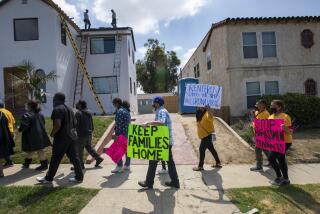‘Court of 1st Resort’ Eases Neighborhood Conflicts
- Share via
SAN FRANCISCO — A little boy shoves a playmate to the classroom floor. Two neighbors scream at each other over a parking space. A furious tenant threatens to sue his former landlord over a security deposit.
What, besides anger and frustration, do these people have in common?
They all solved their problems with help from Community Board Program Inc., which takes such cases from teachers, the police and clogged courts and drops them into the hands of the people.
Community Boards is a 10-year-old, multiethnic volunteer mediation program that has become known as “the court of first resort” in 29 San Francisco neighborhoods.
Community Boards, believed to be the first mediation group of its kind in the nation, has been used as a model for similar programs in 16 U.S. cities, half a dozen American Indian tribes and several foreign countries, including Israel, Australia and Finland.
“Why not deal with problems earlier than wait until they explode,” said the program’s founder, Ray Shonholtz. “That really is the essence of what Community Boards is all about--a (preventive) model that’s able to place the responsibility for conflict resolution back into the hands of the community.”
Through Community Boards, disputes are heard before a panel of volunteers; mediation techniques are taught in public housing projects, military facilities, juvenile detention facilities and corporations, and students are taught how to spot and solve problems while patrolling the playground.
Shonholtz, 42, was a former public defender and criminal law professor at the University of San Francisco when he began to look at European programs used to keep people out of the criminal justice system.
“The notion of citizen panels really intrigued me a lot,” he said. “I think (Community Boards) harkens to older models that were in this country in earlier days when communities were stronger,” such as Chinese and Jewish neighborhoods and Amish and Mennonite communities.
“Even today, when you look at modern, intact communities, you’ll find that one of the resilient things is that they have an indigenous, social form of dispute resolution that puts a lot of responsibility on the disputants themselves,” he said.
88% Success Rate
In the last decade, the program has trained more than 1,500 volunteers in conflict resolution techniques and the success rate for cases has never fallen below 86%, Shonholtz said.
Within the Community Board Program Inc., there are two more offshoots: Community Boards of San Francisco and the Community Board Center for Policy and Training.
Georgia Quinones, director of Community Boards, oversees panel hearings, the program’s main function. She said they take people as young as 14 and as old as 80.
“We want more youth and we want more seniors,” she said. “We feel there are many seniors out there who have time and could really benefit from this kind of involvement. It would be a truly empowering involvement. It would not be a patronizing sort of involvement.”
More to Read
Sign up for Essential California
The most important California stories and recommendations in your inbox every morning.
You may occasionally receive promotional content from the Los Angeles Times.










